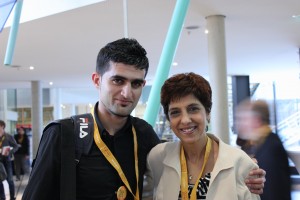On the need for media literacy and how to promote it
The Global Media Forum started on Monday with plenary session 1: “Rating vs. Quality: Media caught between market pressure and the mission to educate.” It was a very engaging discussion, and there were representatives from the US, Germany, Russia and South Africa. Above all, participant Trevor Ncube made a particular impression on me. He is deputy chairman of M&G Media Ltd in South Africa and chairman of Alpha Media Holdings in Zimbabwe, and he started by saying that when the media neglects Africans, it is generating misinformation.
He was referring to a video that we had seen before the panel started called “Colours.” It consisted of several people of different nationalities saying what countries they come from. Even though the piece intended to be universal, there were no Africans there. When Travor asked the audience, “Has anyone noticed anything wrong with the video?” He then proceeded to highlight the lack of Africans, which represent one billion members of the world’s population. I thought to myself: “Yes, that is true, and there are no Latin Americans either on the video.”
The audiovisual piece was not the only thing he took contention with. He also questioned the media’s role in education. “It is presumptuous to say that media has an education role,” he stated: “I always have the premise that my audience is more educated than me.” And with today’s access to media, they are also more informed than in the past. In his view, media’s role is to engage and be relevant to its audience, providing good quality content, analysis and intelligent commentary. Given that there is only a fine line between education and propaganda, Travor finds ascribing an educational role to publishers and other media outlets is rather problematic.
His view struck a cord with me. Ever since I attended the Salzburg Global Seminar on Media and Global Change, I had been thinking how I could transfer the knowledge I got there to others. It was at that seminar that I got to know the subject of media literacy for the first time – as well as how to transfer such knowledge to others in a systematic way. I attended the Salzburg seminar while I was in my last year of journalism school. Since then, I have seen media literacy as a subject that should be taught to teenagers in high school; in my view, people need to be conscious of how media works from a young age. I actually thought of designing a workshop for a high school in my neighborhood.
Trevor’s questions brought up a lot of other questions. Are people who read newspapers and watch TV really more educated than journalists in Argentina? The truth is: It all depends on what fragment of reality you are watching. In my country, poverty-stricken communities are now going through their third generation of non-professional citizens, unemployment and school dropouts. There is a huge phenomenon of retelling history on behalf of the ruling party (we call it “reinventing history,” when people manipulate historical facts according to what suits them).
There are two main actors involved in this retelling process: political representatives (through public speeches) and the national media. I prefer to hear all sides of the story in order to make up my mind. And when I do so, I become very conscious of my experiences in higher education. But what about people who didn’t even finish secondary school? Can they tell when reports are far from the truth?
I do believe that by promoting consciousness of these issues, you are working to provide a better quality of life. Learning how to think independently empowers everyone. Maybe the answer is not leaving the subject of media literacy in the dark – for fear of who transfers this knowledge. Instead, maybe the answer is to always work with the other person’s interest in mind, and not your own.





